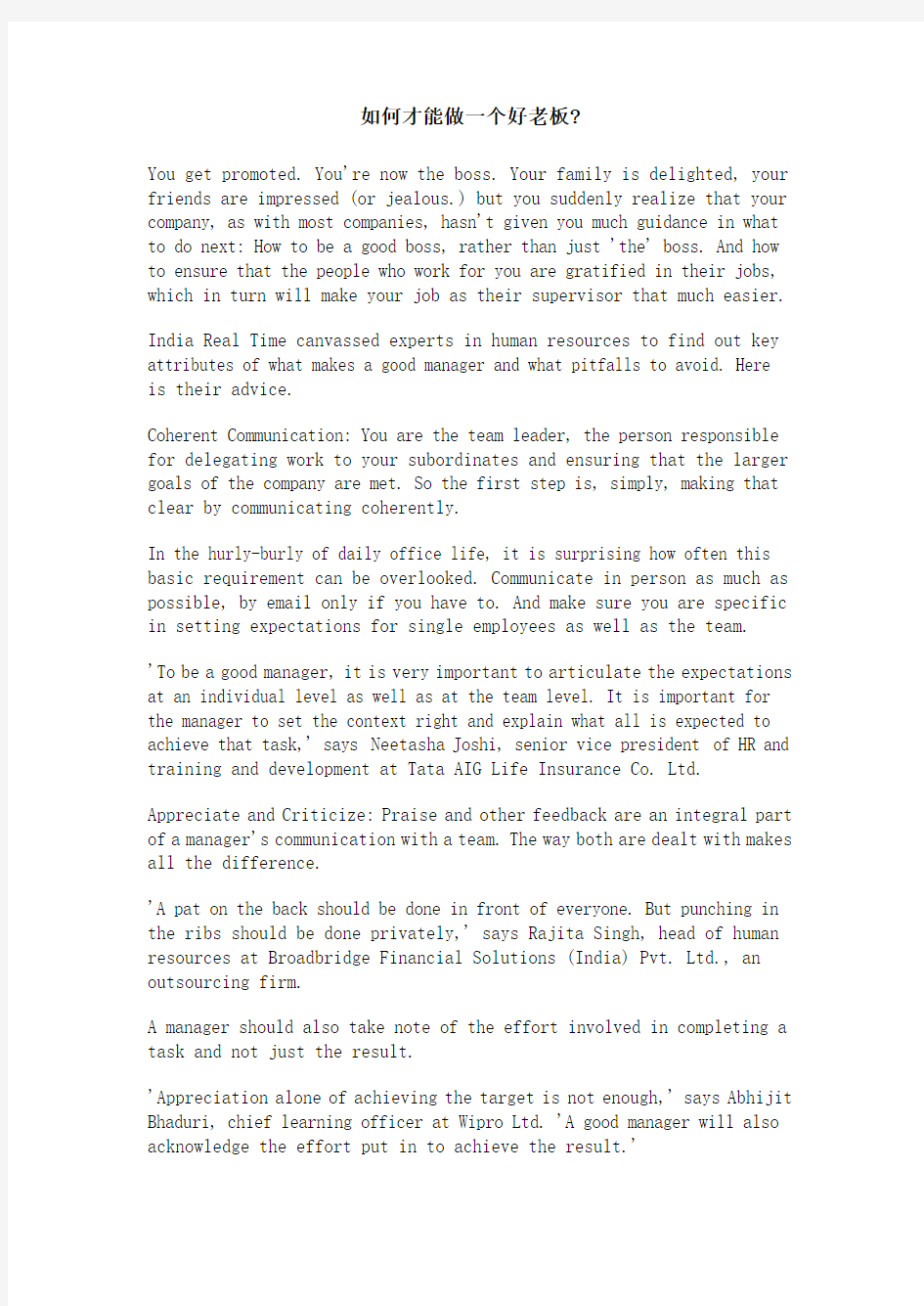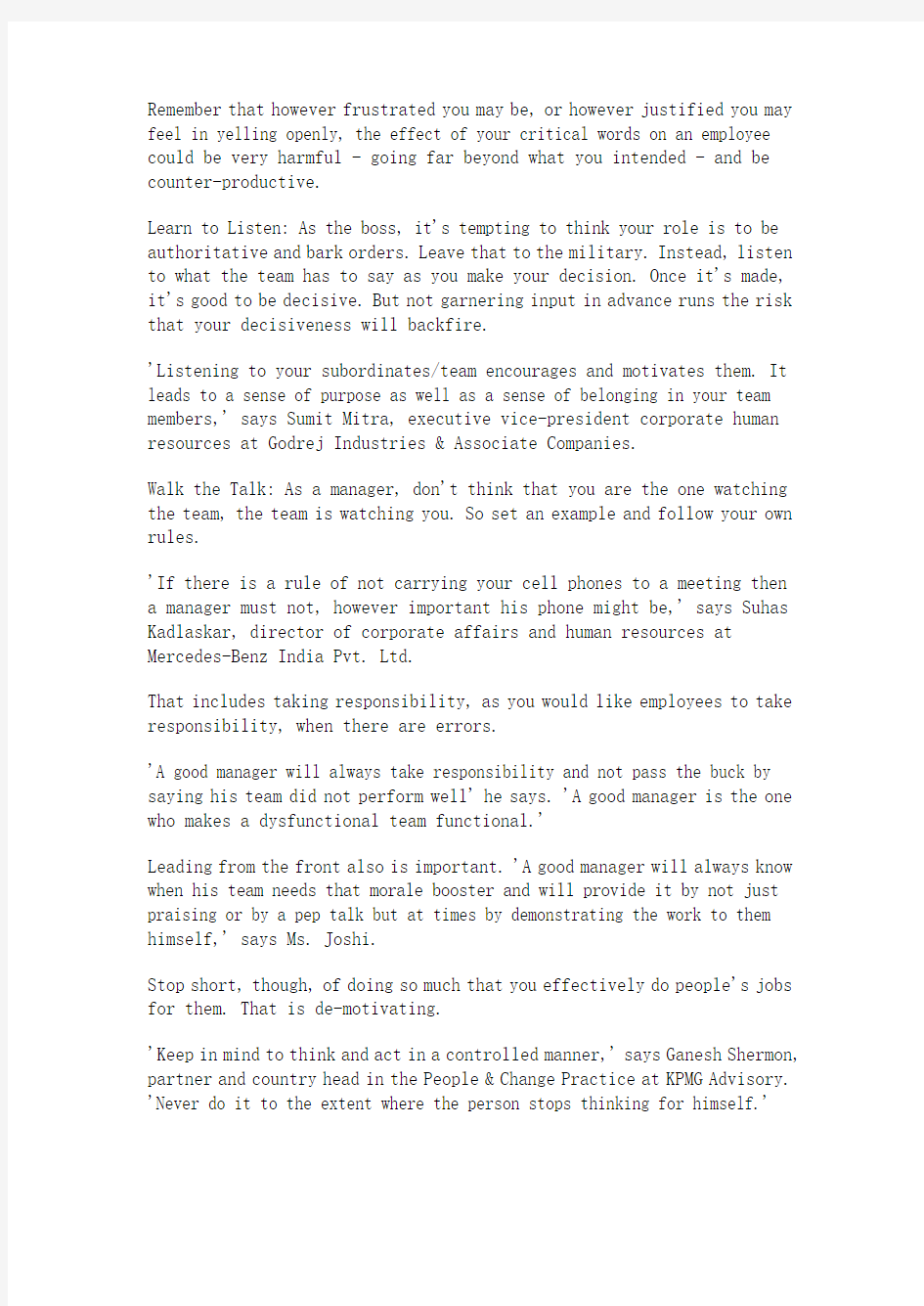

如何才能做一个好老板?
You get promoted. You're now the boss. Your family is delighted, your friends are impressed (or jealous.) but you suddenly realize that your company, as with most companies, hasn't given you much guidance in what to do next: How to be a good boss, rather than just 'the' boss. And how to ensure that the people who work for you are gratified in their jobs, which in turn will make your job as their supervisor that much easier.
India Real Time canvassed experts in human resources to find out key attributes of what makes a good manager and what pitfalls to avoid. Here is their advice.
Coherent Communication: You are the team leader, the person responsible for delegating work to your subordinates and ensuring that the larger goals of the company are met. So the first step is, simply, making that clear by communicating coherently.
In the hurly-burly of daily office life, it is surprising how often this basic requirement can be overlooked. Communicate in person as much as possible, by email only if you have to. And make sure you are specific in setting expectations for single employees as well as the team.
'To be a good manager, it is very important to articulate the expectations at an individual level as well as at the team level. It is important for the manager to set the context right and explain what all is expected to achieve that task,' says Neetasha Joshi, senior vice president of HR and training and development at Tata AIG Life Insurance Co. Ltd.
Appreciate and Criticize: Praise and other feedback are an integral part of a manager's communication with a team. The way both are dealt with makes all the difference.
'A pat on the back should be done in front of everyone. But punching in the ribs should be done privately,' says Rajita Singh, head of human resources at Broadbridge Financial Solutions (India) Pvt. Ltd., an outsourcing firm.
A manager should also take note of the effort involved in completing a task and not just the result.
'Appreciation alone of achieving the target is not enough,' says Abhijit Bhaduri, chief learning officer at Wipro Ltd. 'A good manager will also acknowledge the effort put in to achieve the result.'
Remember that however frustrated you may be, or however justified you may feel in yelling openly, the effect of your critical words on an employee could be very harmful - going far beyond what you intended - and be counter-productive.
Learn to Listen: As the boss, it's tempting to think your role is to be authoritative and bark orders. Leave that to the military. Instead, listen to what the team has to say as you make your decision. Once it's made, it's good to be decisive. But not garnering input in advance runs the risk that your decisiveness will backfire.
'Listening to your subordinates/team encourages and motivates them. It leads to a sense of purpose as well as a sense of belonging in your team members,' says Sumit Mitra, executive vice-president corporate human resources at Godrej Industries & Associate Companies.
Walk the Talk: As a manager, don't think that you are the one watching the team, the team is watching you. So set an example and follow your own rules.
'If there is a rule of not carrying your cell phones to a meeting then a manager must not, however important his phone might be,' says Suhas Kadlaskar, director of corporate affairs and human resources at Mercedes-Benz India Pvt. Ltd.
That includes taking responsibility, as you would like employees to take responsibility, when there are errors.
'A good manager will always take responsibility and not pass the buck by saying his team did not perform well' he says. 'A good manager is the one who makes a dysfunctional team functional.'
Leading from the front also is important. 'A good manager will always know when his team needs that morale booster and will provide it by not just praising or by a pep talk but at times by demonstrating the work to them himself,' says Ms. Joshi.
Stop short, though, of doing so much that you effectively do people's jobs for them. That is de-motivating.
'Keep in mind to think and act in a controlled manner,' says Ganesh Shermon, partner and country head in the People & Change Practice at KPMG Advisory. 'Never do it to the extent where the person stops thinking for himself.'
Be Friendly but Not Necessarily Friends: It is tempting, especially for new managers, to try to win over their employees by acting as a friend rather than a boss. The BBC has made a whole hit comedy series out of this misguided effort. Instead, be friendly and approachable but keep enough distance that no-one in the office feels left out and so you have sufficient room should you need to take disciplinary action against an employee.
This is the part most managers dread most. And it is almost always tough. But it's made harder if there is a genuine friendship involved, too. If you do have to fire an employee, do so within the processes established by the company: If it is a dismissal for performance reasons, it should be preceded by warnings and an escalating series of steps designed to right the employee's trajectory.
'A manager has to be fair and firm to ensure that the performance of an individual does not drop below expectation level. In such a situation you can work with the person, support him/her to make things work, but also ensure that you as a manager cannot take up and fulfill those responsibilities,' says Pritpal Singh Kular, director of human resources at Max Bupa Health Insurance Co. Ltd. 'Discussion is important to make the person understand the gravity of the situation.'
你高升了,现在你是别人的老板了。家人为你高兴,朋友们对你钦佩有加(或是心怀嫉妒),可是你却突然意识到,跟多数公司一样,你所在的公司也没有给你提供下一步该怎么走的指引:该如何成为一个好老板,而不是徒有老板之名;如何让你手下的员工心情愉悦地做好工作(如此一来,身为主管的你工作也会容易得多)。
印度实时报栏目征询了一些人力资源专家的意见,探讨了一名优秀管理者需要具备的关键特质以及需要尽量避免的一些易犯的错误。以下便是他们的建议。
协调的沟通:现在你是团队领导,需要负责向下属委派任务以确保公司的大目标得以实现。所以很显然,第一步就是通过协调的沟通把任务分派清楚。
而在喧嚣嘈杂的日常办公当中,这个最根本的要求受忽视的程度却是出人意料的。尽可能与下属当面沟通,必要的时候才发电邮。还要确保为整个团队以及每一位员工都设定了明确的期许。
Tata AIG Life Insurance Co. Ltd.人力资源及员工培训与发展资深副总裁乔希(Neetasha Joshi)表示,一名好的管理者应当从团队层面和员工个人层面清晰表述出对于下属的期许,这一点非常地重要。管理者要向下属阐明目标,并说明怎样才能达到这个目标。
赞赏与批评:赞赏和批评是管理者同自己下属团队的沟通中不可或缺的一项内容。处理方式不同,效果也会截然有别。
外包公司布罗德里奇金融解决方案公司印度分公司(Broadbridge Financial Solutions (India) Pvt. Ltd.)的人力资源主管辛格(Rajita Singh)表示,轻拍下属肩膀以示鼓励的动作要当着所有人的面来做,而擂其胸部表示批评的动作不妨就私底下做做吧。
管理者还应当关注完成目标过程中每位员工所做出的努力,而不仅仅是结果。Wipro Ltd.首席学习长巴杜里(Abhijit Bhaduri)说,只对目标的实现予以表扬是不够的,一名好的管理者还得对员工在此过程中付出的努力表示出感谢。
切记,不管你有多恼怒,也不管你有多么正当的理由可以冲着下属咆哮,你的批评性话语对下属伤害都会非常地大──大大超出你的预期──而且会产生适得
其反的效果。
学会倾听:身为老板,你很可能会认为自己的角色就是发号施令的权威。军队才需要那样的做派呢。做决策的时候一定要听听团队成员的意见。决策做出之后,果敢执行自然是好的。但是在做出决策之前自行其是,不听取他人意见,这样的果敢就不一定能产生好的效果了。
Godrej Industries & Associate Companies企业人力资源执行副总裁迈特拉(Sumit Mitra)说,倾听下属及团队的建议对他们来说是一种激励,这能赋予你的团队成员以方向感和归属感。
言行一致:作为管理者,不要把自己定位为团队的监督者,事实上,是整个团队在监督着你。因此,一定要树立起一个好的榜样,身先士卒遵守你自己确定的规则。
梅赛德斯-奔驰印度分公司(Mercedes-Benz India Pvt. Ltd.)企业事务及人力资源主管卡德拉斯卡尔(Suhas Kadlaskar)说,如果有规定开会时不可以随身携带手机,那么管理者也应当身体力行,不管随身携带手机对他而言有多重要。
此外,管理者还应当勇于承担错误,这也是你对于下属的期许。
卡德拉斯卡尔说,一个好的管理者必须勇于承担责任,而不是把责任推给下属,责怪他们没有好好表现。一个好的管理者能够把一支效率低下的团队调动起来,成为一支高效的团队。
身先士卒也很重要。乔希说,一个好的管理者总是胸有成竹,知道团队在什么时候需要鼓舞士气,他不是仅仅表扬下属或是发表一通令人振奋的讲话,而是亲自上阵,向下属展示该如何开展工作。
当然要适可而止,否则你就会越俎代庖了。那样的话反而会使士气低落了。
毕马威(KPMG Advisory)合伙人及People & Change Practice项目印度负责人谢尔蒙(Ganesh Shermon)表示,切记,帮员工考虑问题和做事情都要适可而止。不要过犹不及,否则你的下属就不会自己思考问题了。
对员工友好,但是不必成为朋友:很多管理者,尤其是新上任的管理者,很容易会以朋友而非老板的形像来获取民心。BBC有一部大热喜剧剧集便是围绕这种有欠妥当的做法展开剧情的。恰当的做法是,对下属友好、平易近人,但是又要保持一定的距离,这样就不会有哪个下属感觉遭到冷落,也给你自己今后对下属采取惩戒行动留了余地。
这一点是多数管理者最发怵的,而且落实起来很难。但是如果你跟下属发展出了真正的友情,事情就更难办了。如果你不得不解雇一位员工,请走公司的既定程序吧:如果原因是这位员工工作表现欠佳,在解雇之前公司会给予其警告,并有一些帮助其改进工作的循序渐进的程序。
Max Bupa Health Insurance Co. Ltd.人力资源经理库拉尔(Pritpal Singh Kular)表示,管理者必须做到公正严格,以确保每位下属的表现不会低于公司的预期。你可以跟他协同作战,给予他支持,不过身为领导,你不能一手包办,把本应由下属承担的职责都承揽过来。可以跟他探讨,让他明白事态的严重性,这一点很重要。